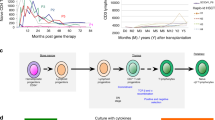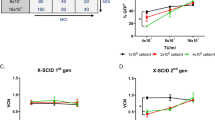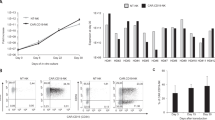Abstract
Transplantation of normal and malignant human hematopoietic cells into severe combined immunodeficient (SCID) mice allows for evaluation of long-term growth abilities of these cells and provides a preclinical model for therapeutic interventions. However, large numbers of cells are required for successful engraftment in preirradiated mice due to residual graft resistance, that may be mediated by cells from the mononuclear phagocytic system. Intravenous (i.v.) injection of liposomes containing dichloromethylene diphosphonate (Cl2MDP) may eliminate mouse macrophages in spleen and liver. In this study outgrowth of acute myeloid leukemia (AML) cells and umbilical cord blood (UCB) cells in SCID mice conditioned with a single i.v. injection of Cl2MDP liposomes in addition to sublethal total body irradiation (TBI) was compared to outgrowth of these cells in SCID mice that had received TBI alone. A two- to 10-fold increase in outgrowth of AML cells was observed in four cases of AML. Administration of 107 UCB cells reproducibly engrafted SCID mice that had been conditioned with Cl2MDP liposomes and TBI, whereas human cells were not detected in mice conditioned with TBI alone. As few as 2 × 104 purified CD34+ UCB cells engrafted in all mice treated with Cl2MDP liposomes. In SCID mice treated with macrophage depletion unexpected graft failures were not observed. Histological examination of the spleen showed that TBI and Cl2MDP liposomes i.v. resulted in a transient elimination of all macrophage subsets in the spleen, whereas TBI had a minor effect. Cl2MDP liposomes were easy to use and their application was not associated with appreciable side-effects. Cl2MDP liposome pretreatment in combination with TBI allows for reproducible outgrowth of high numbers of human hematopoietic cells in SCID mice.
This is a preview of subscription content, access via your institution
Access options
Subscribe to this journal
Receive 12 print issues and online access
$259.00 per year
only $21.58 per issue
Buy this article
- Purchase on Springer Link
- Instant access to full article PDF
Prices may be subject to local taxes which are calculated during checkout
Similar content being viewed by others
Author information
Authors and Affiliations
Rights and permissions
About this article
Cite this article
Terpstra, W., Leenen, P., van den Bos, C. et al. Facilitated engraftment of human hematopoietic cells in severe combined immunodeficient mice following a single injection of Cl2MDP liposomes. Leukemia 11, 1049–1054 (1997). https://doi.org/10.1038/sj.leu.2400694
Received:
Accepted:
Issue Date:
DOI: https://doi.org/10.1038/sj.leu.2400694
Keywords
This article is cited by
-
Animal models of acute myelogenous leukaemia – development, application and future perspectives
Leukemia (2005)
-
Application of xenogeneic stem cells for induction of transplantation tolerance: present state and future directions
Springer Seminars in Immunopathology (2004)
-
Improved engraftment of human acute myeloid leukemia progenitor cells in beta 2-microglobulin-deficient NOD/SCID mice and in NOD/SCID mice transgenic for human growth factors
Leukemia (2003)



